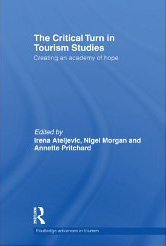 | This second edition explores how critical tourism inquiry can make a difference in the world, link tourism education driven by the values of empowerment, partnership and ethics to policy and practice. This volume is designed to enable its reader to think through vital concepts and theories relating to toursim and hospitality management, stimulate critical thinking and use multidisciplinary perspectives. The book is organised around three key ways of producing social change in and through toursim: critical thinking, crtical education and critical action.
The Critical Turn in Tourism Studies: Promoting an Academy of Hope, edited by Irena Ateljevic, Annette Pritchard and Nigel Morgan (August 2011), Oxford: Elsevier. |
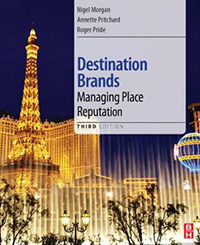 |
Destination Brands asks whether tourism places get the reputations they deserve and discusses brand concepts, challgenges and topical cases. It tackles how place perceptions are formed, how cities, regions and countries can enhance their reputations as creative, competitive destinations and the link between competitive identity and strategic tourism policy-making.
Destination Branding: Creating the Unique Place Proposition, edited by Nigel Morgan, Annette Pritchard and Roger Pride (2010) (3rd Edition) Oxford: Elsevier, in press.
|
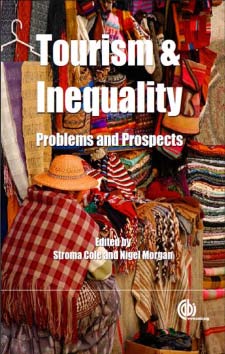 | ‘As someone who has spent my entire working life fighting for equal rights for all people and working to develop stronger communities, I was struck by the evidence and arguments in this edited volume ... about the prevalence of inequality and discrimination in the tourism industry. Fortunately, this book also points to tourism’s potential to act as a powerful force for reducing inequality and positive community development through social inclusion initiatives that incorporate poverty alleviation, and fair trade and ethics practices that support human rights.’ Dr. Cherry Short, CBE, University of Southern California
Tourism and Inequality: Problems and Prospects edited by Stroma Cole and Nigel Morgan (2010) Oxford: CABI |
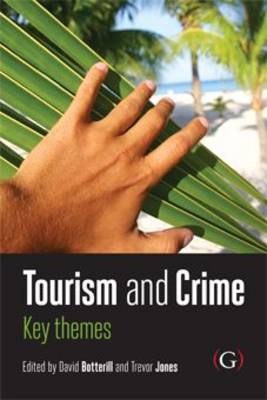 | This is the first book to address the tourism-crime nexus. It provides a critical examination of a number of subjects including tourism and property crime, the tourist as victim, the 'naming and shaming' of specific 'danger travel spots', the governance of safety in 'stateless' spaces, cooperation between justice authorities in different jurisdictions, drugs tourism, plus a range of other relevant issues.
Tourism and Crime: Key Themes (2011) by David Botterill and Trevor Jones (eds.) Goodfellows, Oxford |
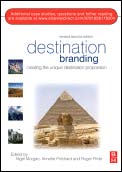 | 'The first edition of this book really put destination branding on the map. Now, this second edition brings together some of the world's leading destination branding experts in a collection which represents the cutting edge of this exciting area of destination marketing.' Francesco Frangialli, Secretary-General of the World Tourism Organisation.
Destination Branding: Creating the Unique Place Proposition, edited by Nigel Morgan, Annette Pritchard and Roger Pride (2010) (revised 2nd edition) Oxford: Elsevier.
|
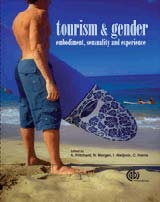 | ‘The editors of this volume ... are on the forefront of a re-energized focus on gender emanating from the critical turn now shaking up tourism’s various academies’, Professor Margaret Swain, University of California, Davis.
Tourism and Gender: Embodiment, Sensuality and Experience, edited by Annette Pritchard, Irena Ateljevic, Nigel Morgan and Candice Harris (2007), Oxford: CABI. |
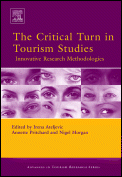 | A ‘pivotal’, ‘outspoken’ book which provides ‘an impressing cavalcade of methodological insights for qualitative and theoretical research’, Professor Soile Veijola, University of Lapland
The Critical Turn in Tourism Studies: Innovative Research Methodologies edited by Irena Ateljevic, Annette Pritchard and Nigel Morgan (2007), Oxford: Elsevier. |
 | This collection addresses the important topic of educational renewal and its contributors reflect on the renewal of the subject fields, the pedagogy that underpins leisure and tourism education and the research methodologies that enable us to contribute new knowledge.
Academic Renewal: Innovation in Leisure and Tourism Theories and Methods, edited by Fiona Jordan, Lindsay Kilgour and Nigel Morgan, Brighton: LSA |
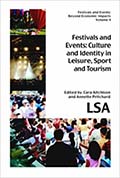 | This volume contributes to the emerging discourses of critical and cultural tourism studies by examining festivals and events as significant cultural sites and sights that produce, reproduce and rework culture and identity in spaces and places ranging from international tourism to local leisure.
Festivals and Events: Culture and Identity in Leisure, Sport and Tourism, edited by Cara Aitchison and Annette Pritchard (2007), Brighton: LSA |
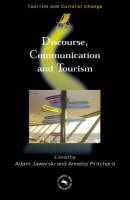 |
Offers an important contribution to the burgeoning field of tourism studies and should, as much for its uniqueness as for the success of its individual essays, prove a point of departure for further work in the field.’ Piers Smith, Gulf University of Science and Technology, in H-Net 2007
Discourse, Communication and Tourism edited by Adam Jaworski and Annette Pritchard (2005), Clevedon: Channel View |
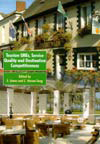 | This book focuses in on the dominant role of SMEs (small and medium-sized enterprises) in the tourism and hospitality industry. It explores their impact on consumer perceptions of a destination, drawing on examples of small hotels, guesthouses, cafes and restaurants. It also highlights the challenges faced by SMEs to promote destination business growth - with discussion of competitiveness, quality and standards.
Tourism SMEs, Service Quality and Destination Competitiveness edited by Eleri Jones and Claire Haven (2005), Oxford: CABI. |
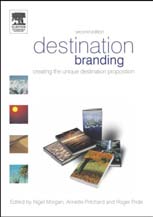 |
This comprehensive text should be on the reading list of all people directly and indirectly involved in destination marketing’, Ian MacFarlane, Chief Executive Officer, Gold Coast Tourism Bureau, formerly GM: Marketing, Tourism New Zealand.
Destination Branding: Creating the Unique Place Proposition, edited by Nigel Morgan, Annette Pritchard and Roger Pride (2004) (2nd. Edition) Oxford: Elsevier. |
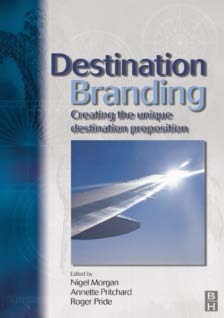 | The value of destination branding is a topic which is increasingly being considered by the marketing departments of tourist boards around the world. I’m sure this book will make a significant contribution to thinking on this subject.’ Jeff Hamblin, Chief Executive, British Tourist Authority.
Destination Branding: Creating the Unique Place Proposition, edited by Nigel Morgan, Annette Pritchard and Roger Pride (2002) Oxford: Butterworth Heinemann. |
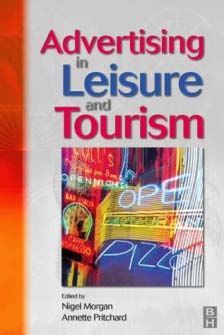 | ‘It makes for fascinating reading for all, not least because of the extensive examples given of global companies and their advertising activities... a must have for any student studying tourism and travel management’. Hospitality.
‘I’ll be at the top of the list to buy it!’ Anna Bryson, Brand Manager, British Tourist Authority.
Advertising in Tourism and Leisure by Nigel Morgan and Annette Pritchard (2001), Oxford: Butterworth Heinemann. |
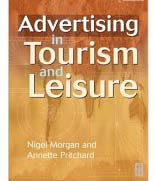 | ‘This is one of the first books to truly explore in a clear and concise manner how tourism and leisure advertising does and does not work. The extensive use of relevant examples helps to illustrate how advertising concepts work in practice’. Brian Hay, Head of Research, Scottish Tourist Board
Advertising in Tourism and Leisure by Nigel Morgan and Annette Pritchard (2000), Oxford: Butterworth Heinemann. |
